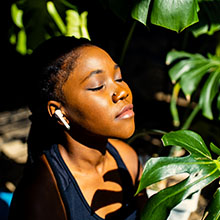Will doctors one day prescribe nature walks instead of pills? That may start happening sooner than you think.
There’s a growing body of scientific evidence that demonstrates the benefits of nature, including its impact on stress and anxiety.
That’s what a team of researchers at the Montreal Heart Institute (MHI) has observed. Under the direction of Professor Louis Bherer, the team conducted a review of the scientific literature on this topic.
Need help managing your stress?
Use the Lumino Health search tool to find health care professionals in your area.
What are the benefits of spending time outdoors in nature?
According to the report, the list of benefits of spending time in nature is a long one. It’s good for your health, both physical and mental.
1. The physiological benefits include:
- a reduction in cortisol levels (a stress indicator),
- slower heart rate, and
- lower blood pressure.
2. The psychological benefits can lead to:
- a decrease in depression and negative emotions,
- increased energy levels,
- significant reduction in anxiety, and
- improvements in mood.
3. The cognitive benefits can cause:
- improvement in cognitive function,
- improved ability to focus and pay attention, and
- a reduction in mental fatigue and confusion.
How much time should you spend outdoors to get the benefits of nature
A study published in Nature suggests that 120 minutes a week in nature is the ideal minimum. And the time spent in nature didn’t have to be all at once. The benefits of nature appear to be the same if it’s broken up into smaller blocks over the week.
How to spend more time in nature
Looking to spend more time in nature? The good news is you don’t have to go very far. Your neighbourhood park is all you need to reap the benefits, and it’s free.
Here are some other ideas to help you get out in nature:
- Take breaks outside. Even if you only have a few minutes, consider taking a short walk. Pay attention to the trees and plants around you. Listen to the sounds of the birds and feel the breeze on your skin.
- Visit nearby nature sites. Even urban areas have woodlands, public gardens and streams or rivers. Get out and explore nature near you. Go with family or friends on a walk, enjoy a picnic or play a game like frisbee. Visiting an outdoor space near you is a free or low-cost way to spend time in nature.
- Plan a nature trip. If you want to spend more time in nature, schedule a nature trip. It could be to a national or provincial park to hike, camp, fish, canoe or bike.
- Start a garden. Have space for a garden at home? A garden is a simple way to help yourself spend more time outside. Growing even a small amount of your own food is another way to integrate nature in your life.
Read more:
- How can chronic stress affect your heart?
- 4 simple ways to practice self-care and reduce stress
- 5 ways to be happy in hard times
This article is meant to provide general information only. It’s not professional medical advice, or a substitute for that advice.




